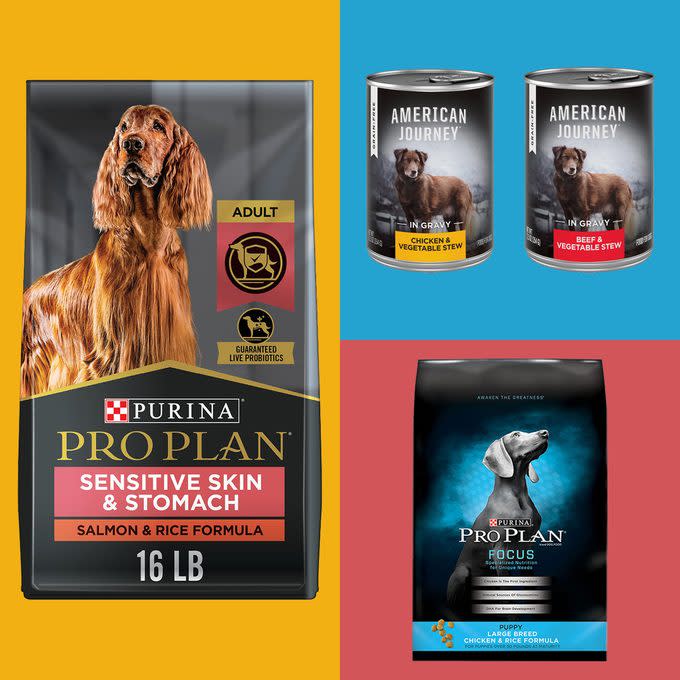The Very Best Large Breed Dog Food

Different breeds, different needs
If you have a dog, you know that choosing the right food for them is essential. That’s why you might be looking for the best natural dog food or the best grain-free food for your pet’s specific needs. But did you know that size also plays a big role when it comes to the best diet for your dog? Well, it does, which is why you want to be smart about choosing the best large breed dog food if you have an oversized fur baby at home. Before we get into the specific vet-approved recommendations, there are a few things you need to know.
What’s different about large breed dog food?
It really boils down to calories in relation to your dog’s metabolism. “Smaller breed dogs typically have a higher metabolic rate and actually burn more calories per pound,” explains veterinarian Joel Beth Navratik, DVM, former CEO of MRVL Pet Pharmaceuticals. “Large breed puppies need to be calorie-restricted to prevent rapid weight gain.” This is especially important because studies show that if a large breed puppy gains too much weight in his first year of life, he will be much more prone to arthritis in his later years. For that reason, large breed dog food is usually crafted with fewer calories. It also tends to boast bigger pieces of kibble that help slow down a dog’s eating speed.
Should large dog breeds eat a grain-free or a BEG diet?
In case you aren’t familiar with the term, a BEG diet is one that consists of boutique, exotic, and grain-free foods. While the FDA hasn’t released an official statement about the safety of grain-free diets for dogs, they have released statements over the years in response to reports that link pet foods containing lentils, peas, legumes, and potatoes as main ingredients with canine dilated cardiomyopathy (DCM), a serious heart condition; those ingredients are usually what takes place of the grains in certain foods. Because of this, most pet experts are against grain-free diets. “Large breed dogs typically should not be fed a grain-free diet unless prescribed by their veterinarian,” Dr. Navratik explains. Other veterinarians note that many BEG diets aren’t formulated to meet the specific nutrient needs of large breed dogs.
What should you look for in large breed dog food?
You should take several factors into consideration, including your dog’s age, breed, size, and activity level. For instance, large breed puppy foods should have a good amount of protein. “They should have 30 percent protein and 9 percent fat on a dry matter (DM) basis in addition to calcium amounts up to 1.5 percent and phosphorus around 0.8 to 1 percent DM,” explains Michelle Burch, DVM, a veterinarian with Safe Hounds Pet Insurance. “Large breed puppy foods should also not be fed to a dog in all its life stages.”
For adult dogs, you’ll need a diet that provides a balanced ratio of fats, carbohydrates, and proteins. “Pay close attention to the labels on dog food and look for foods labeled ‘complete and balanced,’ which is the best indicator that a food has all the necessary nutrients,” says George Melillo, DVM, Chief Veterinary Officer and cofounder of Heart + Paw. Beyond that, of course, you’ll want to take your dog’s special needs and preferences into consideration, as well as consult your vet. The expert-approved picks on this list will get you off to a good start and help your dog live a long, healthy life.
The post The Very Best Large Breed Dog Food appeared first on Reader's Digest.
